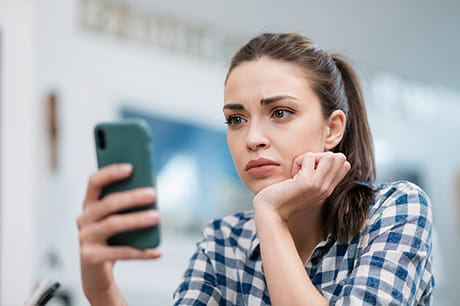When is it time for a break from social media?
We all love sharing and seeing photos of family and friends. But moderation is key to keeping things balanced.
Social media has become a large part of our lives. From inviting friends and family to your son’s third birthday party to sharing photos of your solo trip to Ireland, it’s a way for us to connect and share our lives with others.
But when we focus too much on how others react, social media can start to take a toll on our mental health. The key to finding balance? Knowing when to take a break.
Setting boundaries and limiting social media
Practice self-care by setting boundaries and limiting social media. And sticking to the boundaries you set for yourself will help you have a healthy relationship with your phone and your feed.
“Set a limit for your overall time on social media each day. You can even manage your app use by setting time limits on some phones,” says Dr. Julie Hergenrather,” behavioral medicine psychologist at Geisinger Community Medical Center. “And make sure you don’t let scrolling on your phone interfere with actual face-to-face time with friends and family.”
Oftentimes, we turn to social media for an escape, only to be met with unrealistic beauty expectations, negative news postings and even bullying. But setting boundaries will limit this exposure and help us manage our mental health and dependence on our devices.
Signs you need to take a break:
- Scrolling through your feed isn’t fun anymore
- You’re comparing yourself to photos of others
- You spend a lot of time scrolling through your apps, sometimes mindlessly
- Posting about every experience impacts your ability to enjoy the moment
- Your phone is the first thing you reach for in the morning, when you wake up or when you have a moment to spare
- You feel anxious when you don’t have your phone
- You’re noticing your mood is taking a hit
Use your phone to your advantage
More time moving is less time spent on our phones — but you don’t need to be entirely disconnected from social connections to get some exercise.
“Try downloading a fitness app that has its own community. One where you can schedule workouts at the same time as your friends,” says Dr. Hergenrather. That way, you get the benefits of virtual connections while also getting some healthy activity.
When you’re in apps like this, you’re sharing similar goals with other users and encouraging one another. It’s refreshing and inspiring, especially when you compare it to highly edited photos of someone working out at an elite gym. These apps often feel real and more positive.
How to take a break from your social media accounts
Our phones aren’t our foes. You can use yours to set reminders to move, meditate or even meal prep. And keeping social apps less accessible can improve more than just your phone’s battery life.
“Social media usage has been connected to eating disorders, depression and anxiety,” says Dr. Hergenrather. “That’s why it’s extremely important to be aware of our social media usage — and to recognize when we need to take a break.”
If you’re having a hard time taking a break from your social accounts, try the tried-and-true method of deleting the apps from your phone and only accessing them on your computer.
“Many schools and workplaces block access to social accounts, so accessing them during work and school hours can only be done on your phone. Deleting those apps from your phone naturally limits your exposure,” says Dr. Hergenrather. “But don’t just delete them — consider replacing them with more mindful apps, like meditation or word puzzles that boast benefits like helping you manage stress or boosting your brain power.”
Turning off notifications for your social apps limits your need to check them as soon as someone posts or interacts with something you post. Set specific start and end times for scrolling social media. You’ll find that, over time, scrolling your feed and notifications naturally decreases and you feel less driven by what’s going on in the social media world.
Another tip: Buy an old-fashioned alarm clock and leave your phone in another room overnight. The added benefit of no nighttime scrolling is less exposure to blue light, which has been connected to poorer sleep quality.
The upshot? Being less connected can make you more connected to real life. Set boundaries and take breaks from social media to get in-person laughter and memories you’ll keep near and dear. And when you do post or scroll, it might be more meaningful than ever before.
Next steps:
Meet. Dr. Julie Hergenrather
Make your phone work for you. Learn about digital assistants
Here are 3 ways generosity can improve your health





